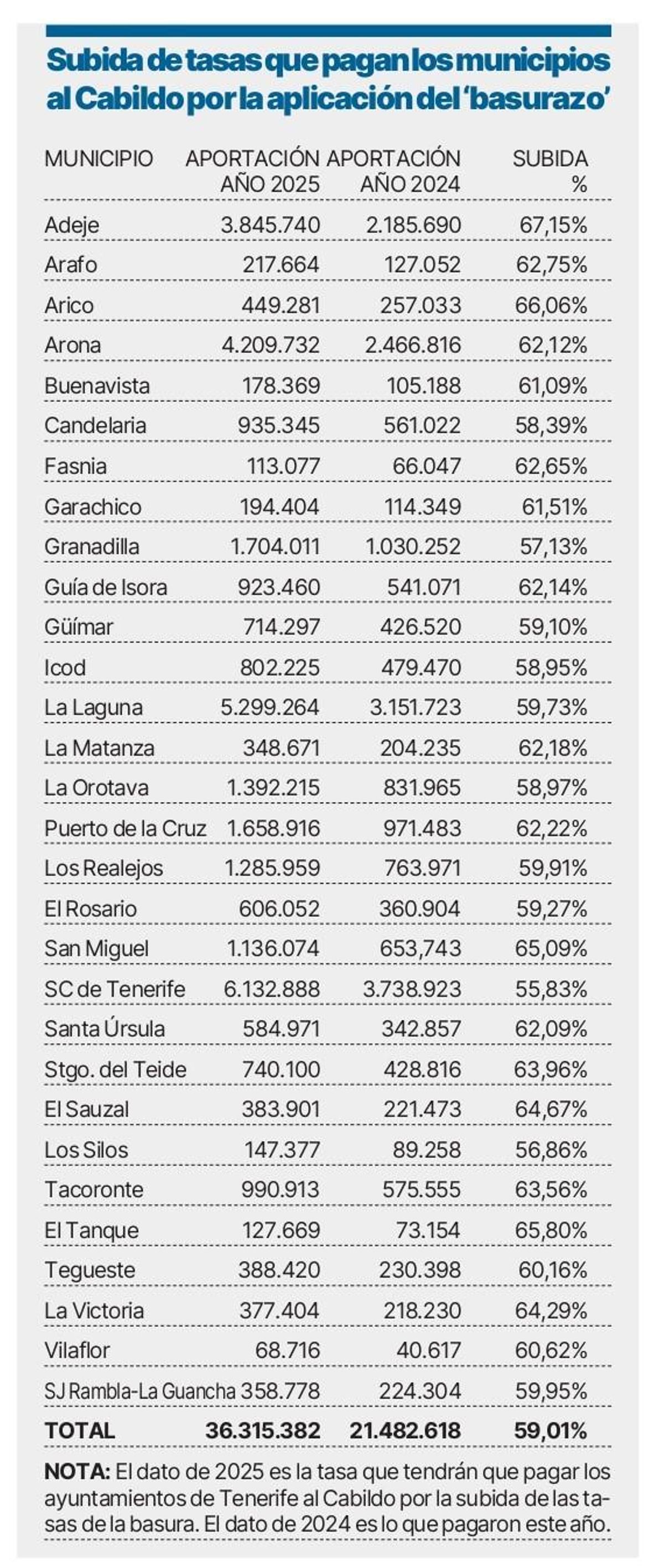The substantial increase in the waste management fees to align prices with new European regulations has led the municipalities of Tenerife towards discontent. There are already precise forecasts regarding what is dubbed the rubbish bin or waste bin. From 2025 onwards, councils will be required to pay an additional 15 million Euros annually to the Cabildo for the processing of their waste. The average price hike across municipalities surpasses 59%.
The projections regarding the impact of waste charges appear in a report that the Corporation has presented to the municipalities during the coordination process initiated to implement the rate restructuring mandated by Europe. The Cabildo has commenced this series of discussions within the framework of the Island Council of Territorial Administration of Tenerife, a platform through which the Tenerife Corporation interacts with the 31 local governments of the Island. The aim is to discover methods to alleviate the repercussions of this tax, which is set to take effect next year across Spain.
In any event, it will be exceedingly challenging for the municipalities to evade this substantial increase in waste fees owed to the Cabildo, the authority responsible for waste management at the island level. The report itself indicates that the increase is “compulsory compliance” as stipulated by the new national and EU regulations. The necessity to embrace this transformation will compel councils to transfer the rate hike onto citizens, suggesting that the municipal waste tax, paid annually, will likely surge beyond 50%. For instance, Santa Cruz de Tenerife charges 66.28 Euros for waste management.
The municipalities are starting to resist as they regard the ‘garbage’ tax
Indeed, the capital is the locality where the tax, according to the Cabildo report, will see the least increase: a 55.8% rise in what it needs to remit to the insular Corporation, resulting in an increase from 3.7 million Euros this year to 6.1 million in 2025. Conversely, Adeje faces an increase of 67.15% (from 2.1 million to 3.8 million Euros). No municipality will escape a price hike of over 56%, an additional financial burden that has sparked significant discontent among mayors and municipal councillors.
In an institutional motion ratified during the plenary session on 27 October 2023, the island government group committed to conducting as many discussions as necessary with the island councils, including convening an Island Council of Territorial Administration of Tenerife, prior to adopting any measures that would lead to an increase in fees paid by municipalities for services outlined in the Special Territorial Plan for Waste Management.

City council charges. / ED
To ease the transition to the new waste framework, that same motion stipulates that the island Government “will enforce a moratorium until 10 April 2025, during which the current fee will be maintained, enabling the municipalities of Tenerife to undertake the necessary actions (municipal ordinances with updated rates, processing new municipal waste collection contracts, etc…) to adapt to the new system.
The Canary Islands have begun to resist a change they interpret as a significant blow to the financial stability of local administrations, namely councils and town halls. The president of the Canary Islands Government, Fernando Clavijo, stated in remarks reported by Europa Press that the national Executive “has overstepped” with the implementation of the European waste directive, which he believes will result in “an economic burden for families and will “penalise” the councils.
Santa Cruz de Tenerife faces the smallest increase (55.8%) while Adeje faces the highest (67.1%)
The Canary Islands Parliament has already expressed, on 27 November, its support for “revoking” the compulsory nature of the implementation of waste charges from April 2025. Furthermore, the Chamber has called for the recognition of local councils’ autonomy in establishing their own taxes.
The councils are beginning to voice their opposition. The latest example is Granadilla, which, despite being governed by the PSOE, the very party advocating this measure at the national level, approved a motion on the 27th demanding the repeal of this fee increase due to “its detrimental effect on the financial situations of families and the ambiguity in the implementation criteria.
Previously, on the 6th, the Santiago del Teide City Council articulated its “strong objection to the requirement for local authorities to impose a waste charge, thereby having to forward the entire cost to citizens.” The list of municipalities expressing dissent is expected to keep growing in the upcoming months.
Subscribe to continue reading
















